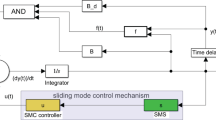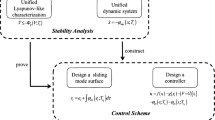Abstract
In this paper, the design of event-triggered sliding mode controller for singular Markovian jump systems is studied. Firstly, the event-triggered sliding mode control (ETSMC) law is designed, it can ensure the reachability of sliding surface. Then for singular Markovian jump systems, a lemma is given to overcome the difficulties arising from the ETSMC strategy. Secondly, a set of sufficient condition is proposed by using Lyapunov function method to ensure the stochastic admissibility of the sliding mode dynamics. Then, a positive lower bound of the inter execution time can be ensured, which illustrates that the Zeno behavior does not occur. Finally, the simulation is given to reflect the effectiveness of theoretical results in this paper.












Similar content being viewed by others
Data Availability
Data sharing is not applicable to this article as no datasets were generated or analyzed during the current study.
References
A. Behera, B. Bandyopadhyay, Self-triggering-based sliding-mode control for linear systems. IET Control Theory Appl. 9(17), 2541–2547 (2015)
A. Behera, B. Bandyopadhyay, Event based sliding mode control with quantized measurement, in 2015 International Workshop on Recent Advances in Sliding Modes (RASM)
A. Behera, B. Bandyopadhyay, Event-triggered sliding mode control for a class of nonlinear systems. Int. J. Control 89(9), 1916–1931 (2016)
A. Behera, B. Bandyopadhyay, Robust sliding mode control: an event-triggering approach. IEEE Trans. Circuits Syst. Express Briefs 64(2), 146–150 (2017)
A. Behera, B. Bandyopadhyay, X. Yu, Periodic event-triggered sliding mode control. Automatica 96(7), 61–72 (2018)
L. Chen, X. Li, W. Lin, Q. Zhou, Adaptive event-triggered \(H_{\infty }\) control for Markov jump systems with generally uncertain transition rates. Circuits Systems Signal Process. 39, 5429–5453 (2020)
Q. Chen, D. Tong, W. Zhou, Y. Xu, J. Mou, Exponential stability using sliding mode control for stochastic neutral-type systems. Circuits Systems Signal Process. 40(7), 2006–2024 (2021)
P. Cheng, S. He, V. Stojanovic, X. Luan, F. Lui, Fuzzy fault detection for Markov jump systems with partly accessible hidden information: an event-triggered Approach. IEEE Trans. Cybern. 52(8), 7352–7361 (2021)
H. Deng, K. Krstic, Stochastic nonlinear stabilization-I: a back-stepping design. Syst. Control Lett. 32(3), 143–158 (1997)
S. Dong, G. Chen, M. Liu, Z.G. Wu, Robust adaptive \(H_{\infty }\) control for networked uncertain semi-Markov jump nonlinear systems with input quantization. Sci. China Inf. Sci. 65, 189201 (2022)
C. Edwards, S.K. Spurgeon, Sliding Mode Control: Theory and Applications (Taylor & Francis, London, 1998)
X. Fan, Z. Wang, Event-triggered integral sliding mode control for linear systems with disturbance. Syst.Control Lett. 138, 104669 (2020)
X. Fan, Z. Wang, Event-triggered sliding mode control for singular systems with disturbance. Nonlinear Anal. Hybrid Syst 40(11), 101011 (2021)
X. Fan, Q. Zhang, J. Ren, Event-triggered sliding mode control for discrete-time singular system. IET Control Theory Appl. 12(17), 2390–2398 (2018)
Z. Feng, J. Li, P. Shi, Z. Jiang, Sliding mode control of singular stochastic Markov jump systems, in Emerging Methodologies and Applications in Modelling, Identification and Control, pp. 185–201 (2021)
R. Gao, D. Zhai, X. Xie, On the design of output information-based sliding mode controllers for switched descriptor systems: linear sliding variable approach. Appl. Math. Comput. 364, 124680 (2020)
H. He, X. Gao, W. Qi, Distributed event-triggered sliding mode control of switched systems. J. Frankl. Inst. 356(17), 10296–10314 (2018)
H. Hou, X. Yu, Z. Fu, Sliding mode control of networked control systems: an auxiliary matrices-based approach. IEEE Trans. Autom. Control. https://doi.org/10.1109/TAC.2021.3103882
L. Huang, X. Mao, Stability of singular stochastic systems with Markovian switching. IEEE Trans. Autom. Control 56(2), 424–429 (2010)
B. Jiang, H.R. Karimi, C. Gao, Takagi–Sugeno model based event-triggered fuzzy sliding-mode control of networked control systems with semi-Markovian switchings. IEEE Trans. Fuzzy Syst. 28(4), 673–683 (2020)
H.K. Khalil, Nonlinear Systems, 3rd edn. (Prentice-Hall, Upper Saddle River, NJ, 2002)
J. Li, Q. Zhang, A linear switching function approach to sliding mode control and observation of descriptor systems. Automatica 95, 112–121 (2018)
J. Li, Q. Zhang, X. Yan, S.K. Spurgeon, Integral sliding mode control for Markovian jump T–S fuzzy descriptor systems based on the super-twisting algorithm. IET Control Theory Appl. 11(8), 1134–1143 (2017)
S. Li, C. Ahn, J. Guo, Z. Xiang, Global output feedback sampled-data stabilization of a class of switched nonlinear systems in the p-normal form. IEEE Trans. Syst. Man Cybern.: Syst. 51(2), 1075–1084 (2021)
S. Li, J. Lian, Hidden Markov model based control for singular Markov jump systems. J. Frankl. Inst. 358(8), 4141–4158 (2021)
W. Lin, X. Li, D. Yao et al., Observer-based event-triggered sliding mode control for Markov jump systems with partially unknown transition probabilities. Int. J. Control Autom. Syst. 17, 1626–1633 (2019)
X. Liu, X. Su, P. Shi, C. Shen, Y. Peng, Event-triggered sliding mode control of nonlinear dynamic systems. Automatica 112, 108738 (2020)
R. Ma, X. Shao, J. Liu, L. Wu, Event-triggered sliding mode control of Markovian jump systems against input saturation. Syst. Control Lett. 134, 104525 (2019)
B. Majout, B. Bossoufi, M. Bouderbala, M. Masud et al., Improvement of PMSG-based wind energy conversion system using developed sliding mode control. Energies 15(5), 1–17 (2022)
T. Nguyen, W. Su, Z. Gajic, C. Edwards, Higher accuracy output feedback sliding mode control of sampled-data systems. IEEE Trans. Autom. Control 61(10), 3177–3182 (2016)
R.E. Precup, M.B. Radac, R.C. Roman et al., Model-free sliding mode control of nonlinear systems: algorithms and experiments. Inf. Sci.: Int. J. 381, 176–192 (2017)
W. Qi, Event-triggered sliding mode control for stochastic Markov jump systems, in Part of the Studies in Systems, Decision and Control book Series, 301, 221–240 (2020)
P. Shi, Y. Yin, F. Liu, J. Zhang, Robust control on saturated Markov jump systems with missing information. Inf. Sci. 265, 123–138 (2014)
Y.B. Shtessel, J.A. Moreno, L.M. Fridman, Twisting sliding mode control with adaptation: Lyapunov design, methodology and application. Automatica 75, 229–235 (2017)
A. Sinha, R. Mishra, Control of a nonlinear continuous stirred tank reactor via event triggered sliding modes. Chem. Eng. Sci. 187, 52–59 (2018)
P. Sun, R. Shan, S. Wang, Safety-triggered stochastic tracking control for a cushion robot by constraining velocity considering the estimated internal disturbance. Appl. Math. Comput. https://doi.org/10.1016/j.amc.2021.126761
Y.Y. Tao, Z.G. Wu, Y. Guo, Two-dimensional asynchronous sliding-mode control of Markov jump Roesser systems. IEEE Trans. Cybern. 54(2), 2543–2552 (2022)
Y. Tian, Z. Wang, Finite-time extended dissipative filtering for singular T-S fuzzy systems with nonhomogeneous Markov jumps. IEEE Trans. Cybern. https://doi.org/10.1109/TCYB.2020.3030503
H. Wang, Y. Wang, Dynamic event-triggered and guaranteed cost asynchronous control for singular Markov jump systems against deception attacks, in 2020 39th Chinese Control Conference (CCC). https://doi.org/10.23919/CCC50068.2020.9189191
H. Wang, Y. Wang, G. Zhuang, J. Lu, Asynchronous passive dynamic event-triggered controller design for singular Markov jump systems with general transition rates under stochastic cyber-attacks. IET Control Theory Appl. 14(16), 2291–2302 (2020)
Y. Wang, H. Pu, P. Shi et al., Sliding mode control for singularly perturbed Markov jump descriptor systems with nonlinear perturbation. Automatica 127(1), 109515 (2021)
S. Wen, T. Huang, X. Yu, M.Z. Chen, Z. Zeng, A periodic sampled data sliding-mode control of fuzzy systems with communication delays via the event-triggered method. IEEE Trans. Fuzzy Syst. 24(5), 1048–1057 (2016)
X. Xin, Y. Tu, V. Stojanovic et al., Online reinforcement learning multiplayer non-zero sum games of continuous-time Markov jump linear systems. Appl. Math. Comput. 412, 126537 (2022)
S. Xu, J. Lam, Robust control filtering of singular systems (Springer, Berlin, 2006)
Y. Yu, J. Guo, Z. Xiang, Distributed fuzzy consensus control of uncertain nonlinear multiagent systems with actuator and sensor failures. IEEE Syst. J. https://doi.org/10.1109/JSYST.2021.3098930
D. Zhai, L. An, J. Li, Q. Zhang, Fault detection for stochastic parameter-varying Markovian jump systems with application to networked control systems. Appl. Math. Model. 40(3), 2368–2383 (2016)
D. Zhang, B. Du, Y. Jing, X. Sun, Investigation on stability of positive singular Markovian jump systems with mode-dependent derivative-term coefficient. IEEE Trans. Syst. Man Cybern.: Syst. 52(3), 1385–1394 (2022)
D. Zhang, Y. Jing, Q. Zhang, G.M. Dimirovski, Stabilization of singular T-S fuzzy Markovian jump system with mode-dependent derivative-term coefficient via sliding mode control. Appl. Math. Comput. 364, 124643 (2020)
D. Zhang, Q. Zhang, Sliding mode control for T-S fuzzy singular semi-Markovian jump system. Nonlinear Anal. Hybrid Syst. 30, 72–91 (2018)
J. Zhang, G. Feng, Event-driven observer-based output feedback control for linear systems. Automatica 50(7), 1852–1859 (2014)
Q. Zhang, C. Liu, X. Zhang, Complexity, Analysis and Control of Singular Biological Systems (Springer, London, 2012)
Y. Zhang, J. Guo, Z. Xiang, Finite-time adaptive neural control for a class of nonlinear systems with asymmetric time-varying full-state constraints. IEEE Trans. Neural Networks Learn. Syst. https://doi.org/10.1109/TNNLS.2022.3164948
Z. Zhang, G. Yang, Event-triggered fault detection for a class of discrete-time linear systems using interval observers. ISA Trans. 68, 160–169 (2017)
B. Zheng, X. Yu, Y. Xue, Quantized feedback sliding-mode control: an event-triggered approach. Automatica 91, 126–135 (2018)
Acknowledgements
This work was supported by the Natural Science Foundation of Liaoning Province of China (Grant No. 2020-BS-145), the Foundation of Education Department of Liaoning Province of China ( Grant No. LQGD2020010), the Key R &D Program of Liaoning Province (Grant No. 2020JH2/10100041).
Author information
Authors and Affiliations
Corresponding author
Ethics declarations
Conflict of interest
The authors declare that they have no conflict of interest.
Additional information
Publisher's Note
Springer Nature remains neutral with regard to jurisdictional claims in published maps and institutional affiliations.
Rights and permissions
Springer Nature or its licensor (e.g. a society or other partner) holds exclusive rights to this article under a publishing agreement with the author(s) or other rightsholder(s); author self-archiving of the accepted manuscript version of this article is solely governed by the terms of such publishing agreement and applicable law.
About this article
Cite this article
Zhang, D., Yang, X. & Wang, Y. Event-Triggered Sliding Mode Control for Singular Markovian Jump Systems. Circuits Syst Signal Process 42, 2675–2697 (2023). https://doi.org/10.1007/s00034-022-02250-w
Received:
Revised:
Accepted:
Published:
Issue Date:
DOI: https://doi.org/10.1007/s00034-022-02250-w




